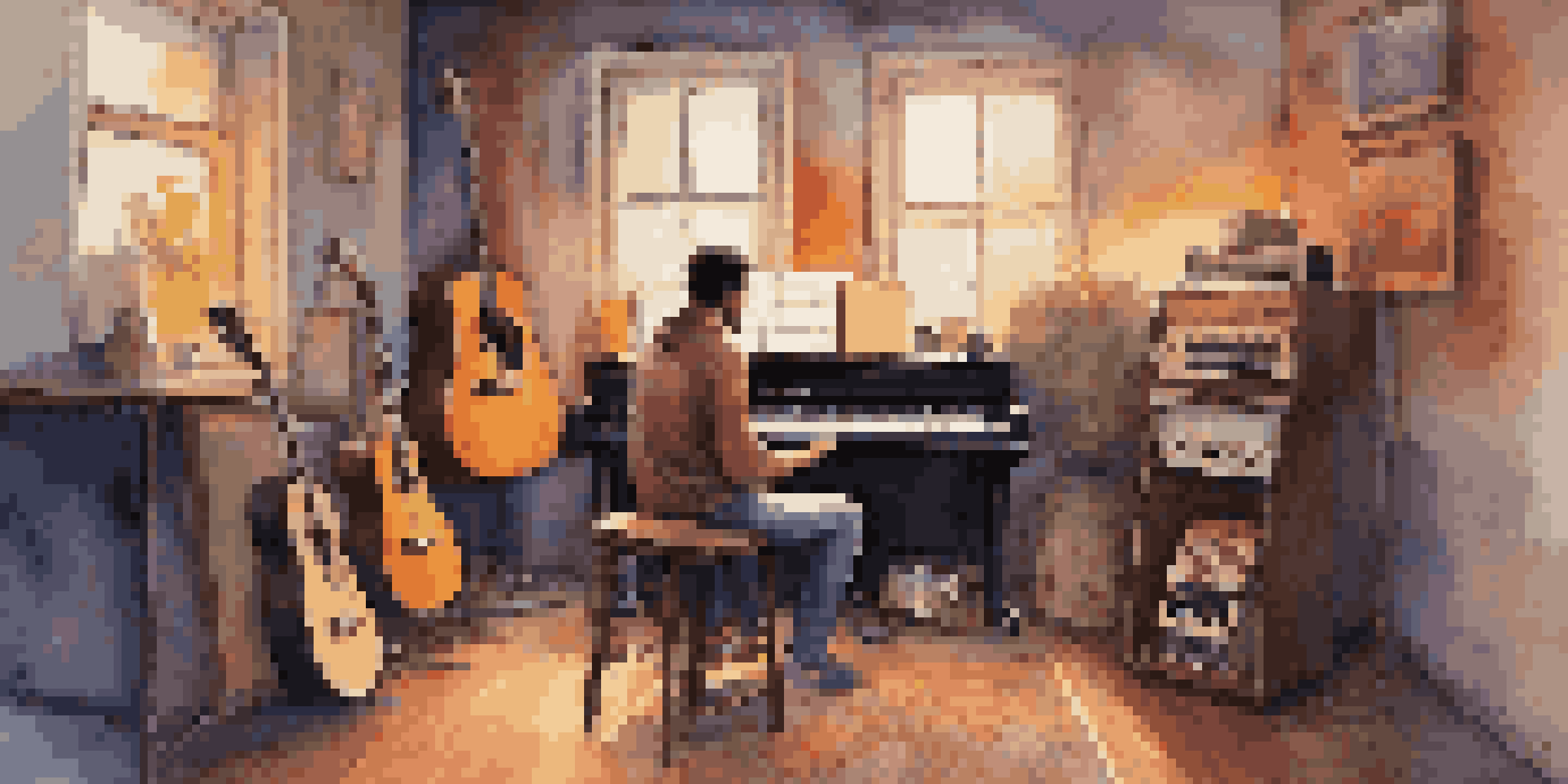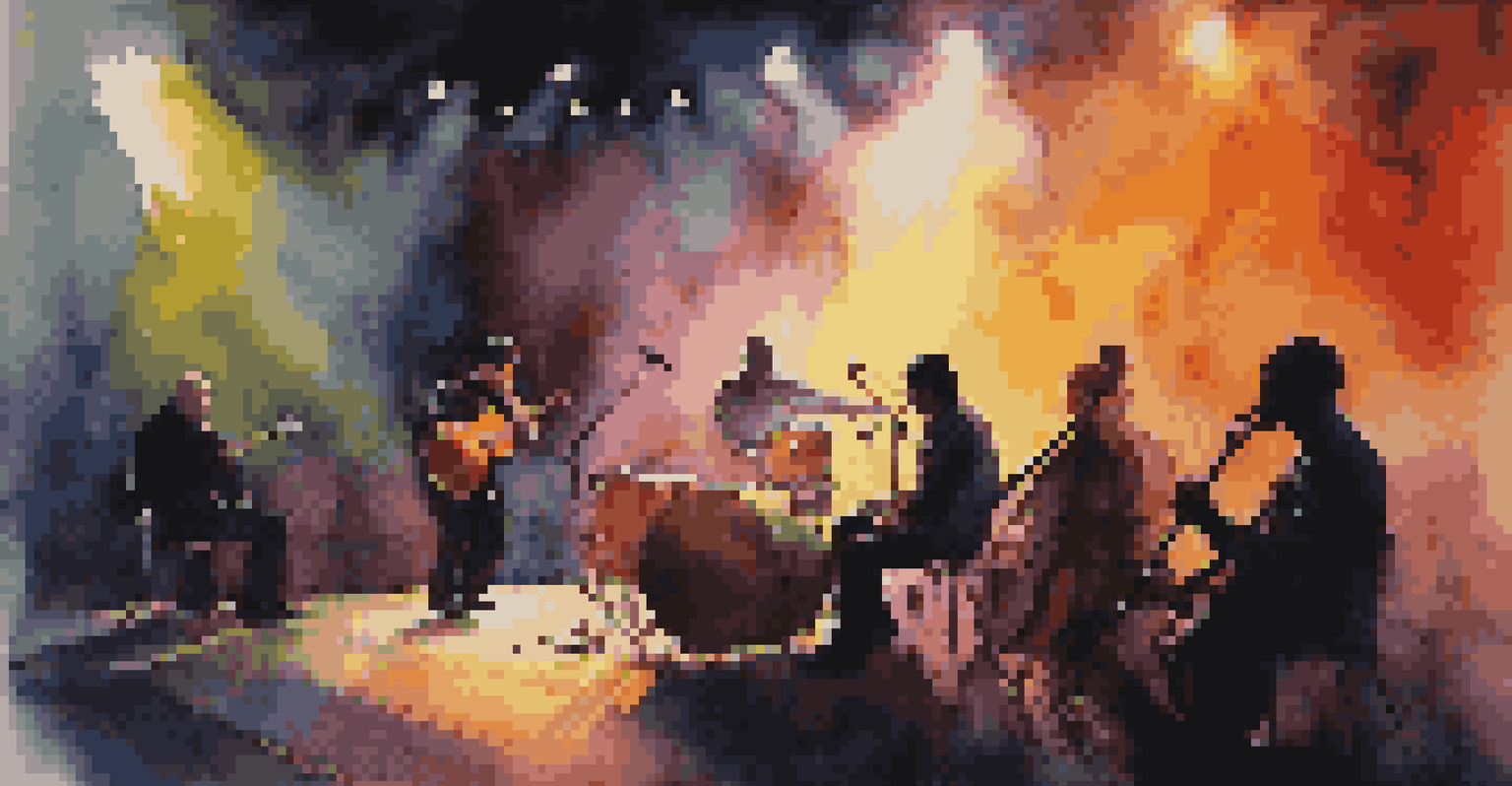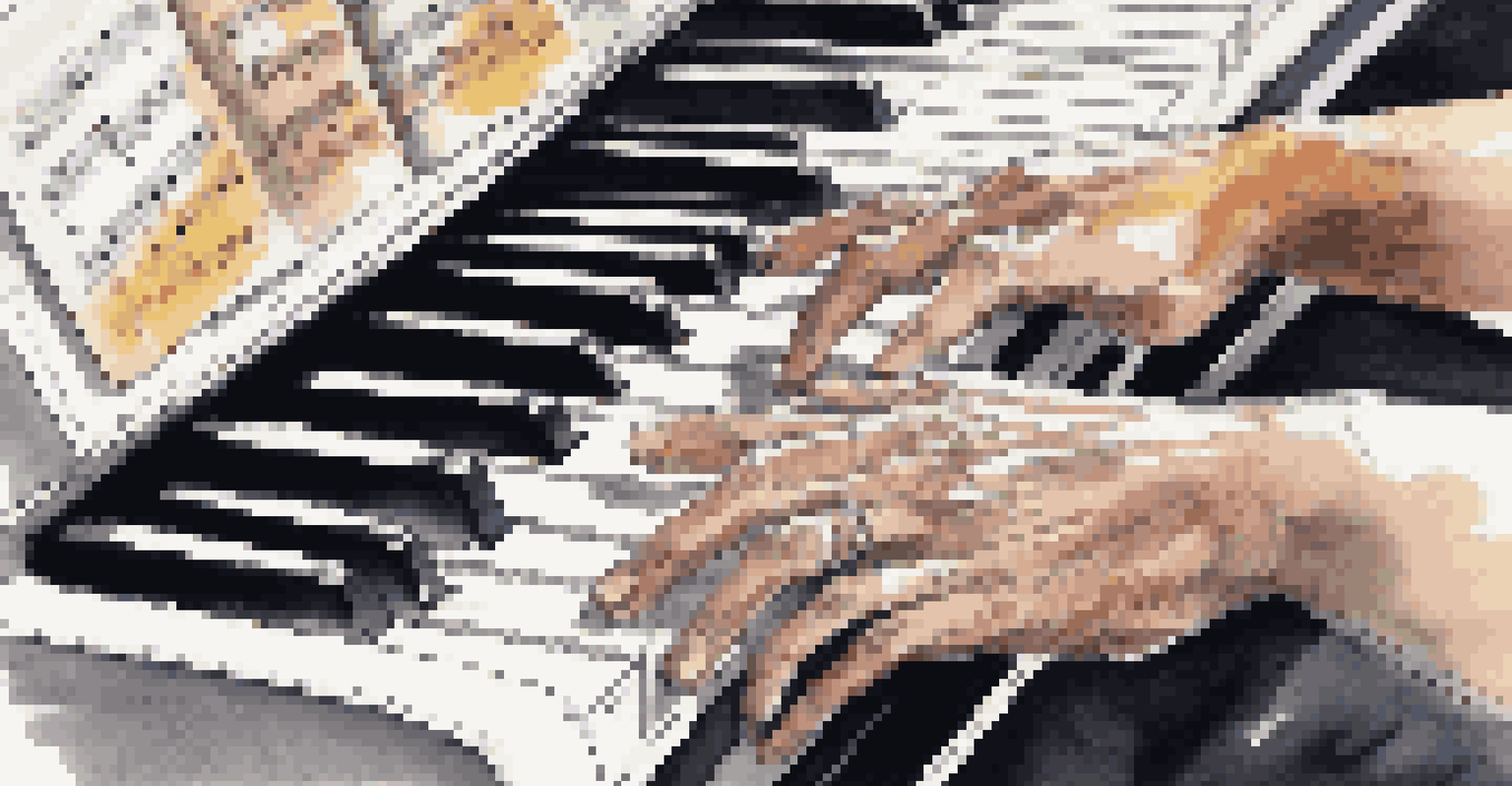The Journey of Healing: Musicians Overcoming Performance Anxiety

Understanding Performance Anxiety in Musicians
Performance anxiety is a common experience among musicians, often manifesting as fear or nervousness before a show. This condition can lead to physical symptoms like trembling hands or a racing heart, making it challenging to perform at their best. Understanding this anxiety is the first step in addressing it, as many musicians find themselves questioning their abilities and fearing judgment.
There’s a lot of pressure to be perfect, and I think that’s what causes anxiety.
Interestingly, performance anxiety isn't limited to novice musicians; even seasoned artists can feel its effects. This phenomenon can be attributed to the high stakes of live performance, where the pressure to deliver can be overwhelming. By recognizing that they are not alone in this struggle, musicians can begin to alleviate some of the pressure they place on themselves.
Moreover, acknowledging performance anxiety opens the door to exploring coping strategies. From mental exercises to physical techniques, musicians can discover what works best for them, turning a potentially debilitating experience into a manageable challenge.
Personal Stories: Musicians Speak Out
Many famous musicians have bravely shared their experiences with performance anxiety, providing insight and hope to others facing similar challenges. For instance, Adele has spoken candidly about her struggles with stage fright, revealing how she often feels paralyzed before going on stage. By sharing her story, she not only normalizes the experience but also encourages fans and fellow musicians to confront their own fears.

Similarly, rock legend Eric Clapton has discussed his battles with anxiety and how it has influenced his music career. His journey illustrates that vulnerability can lead to authenticity in performance, allowing artists to connect more deeply with their audience. These personal anecdotes serve as powerful reminders that even the most successful musicians face hurdles.
Performance Anxiety is Common
Many musicians, regardless of experience, face performance anxiety, which can manifest as physical symptoms and self-doubt.
By listening to these stories, aspiring musicians realize that overcoming performance anxiety is possible. It fosters a sense of community among artists, reminding them that sharing struggles can lead to healing and growth.
Techniques for Managing Anxiety
Musicians have developed various techniques to manage performance anxiety, and these strategies can be incredibly effective. Breathing exercises, for example, can help calm nerves before stepping onto the stage. Simple deep-breathing techniques can slow the heart rate and clear the mind, preparing musicians for the performance ahead.
Music is a source of healing, not just for the audience but for the artist as well.
Visualization is another popular method, where artists mentally rehearse their performances in a relaxed state. By picturing a successful show, musicians can create a positive mindset that counters their anxiety. This mental preparation allows them to approach the stage with confidence and ease.
Moreover, some musicians find solace in mindfulness practices, such as meditation or yoga. These practices promote self-awareness and acceptance, helping individuals stay grounded and focused, regardless of the external pressures they face. By integrating these techniques into their routines, musicians can transform their anxiety into a source of strength.
The Role of Support Systems
A strong support system is vital for musicians dealing with performance anxiety. Friends, family, and fellow musicians can provide encouragement and understanding, creating a safe space for artists to express their fears. This network can be instrumental in helping musicians regain confidence and perspective.
Additionally, many musicians benefit from working with mental health professionals, such as therapists or counselors. These professionals can offer valuable strategies and coping mechanisms tailored to the individual's needs. By addressing anxiety through professional guidance, musicians can cultivate a healthier relationship with their craft.
Coping Techniques are Essential
Musicians can manage performance anxiety through various techniques like breathing exercises, visualization, and mindfulness practices.
Collaboration with other artists can also foster a sense of camaraderie, reminding musicians that they are not alone in their struggles. Sharing experiences and tips can empower them to face their fears together, reinforcing the idea that vulnerability can lead to stronger connections and performances.
Finding Comfort in Routine
Establishing a pre-performance routine can significantly reduce anxiety for many musicians. This routine may include warm-up exercises, vocal practices, or even a specific playlist that helps set the mood. By creating a familiar process, artists can ease their nerves and focus on the joy of performing.
For some, incorporating rituals, such as a lucky charm or a specific outfit, can provide a sense of security. These small but meaningful actions can ground musicians, reminding them of their abilities and past successes. When the stage lights dim, these rituals can serve as anchors in the whirlwind of emotions.
Ultimately, finding comfort in routine encourages musicians to embrace their unique process. By prioritizing what makes them feel secure, artists can transform anxiety into anticipation, ready to share their passion with the world.
The Power of Sharing Experiences
Sharing experiences of overcoming performance anxiety can be incredibly empowering for musicians. By opening up about their struggles, artists not only validate their feelings but also inspire others to do the same. This sense of community encourages a culture where vulnerability is celebrated rather than shamed.
Social media has become a powerful platform for musicians to connect and share their stories. Many artists use these channels to discuss their journeys, creating dialogues around mental health in the music industry. This transparency fosters understanding and support among followers and fellow musicians alike.
Support Systems Foster Healing
A strong support system, including friends, family, and mental health professionals, is crucial for musicians to overcome performance anxiety.
When musicians share their experiences, they break down the stigma surrounding performance anxiety. This openness can lead to a ripple effect, encouraging others to seek help or develop coping strategies, ultimately promoting a healthier mindset across the music community.
Embracing the Journey of Healing
The journey of healing from performance anxiety is ongoing and unique for each musician. Embracing this journey means acknowledging both progress and setbacks, allowing artists to grow in their craft and personal lives. This acceptance fosters resilience, empowering musicians to face challenges head-on.
As musicians learn to navigate their anxiety, they often discover new facets of their artistry. This exploration can lead to innovative performances that resonate more deeply with audiences. When artists channel their experiences into their music, they create a powerful connection that transcends the stage.

Ultimately, the journey of healing is about transformation. By facing their fears and sharing their stories, musicians not only enrich their own lives but also inspire others to embark on their paths toward overcoming anxiety and embracing their true selves.